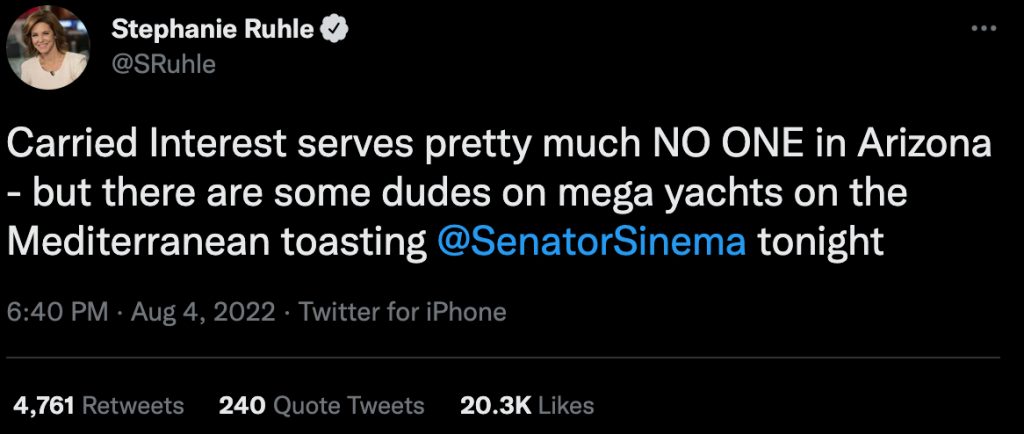While what happens on Twitter–the memes, the controversies–may not resonate with or represent the experiences of the general electorate, many of the trends are illustrative of, and often exacerbate, fundamental challenges to our democracy. Consider so-called Hot Takes, which are defined as “a piece of commentary, typically produced quickly in response to a recent event, whose primary purpose is to attract attention.” The Internet has accelerated the speed with which we both gain access and react to current events. Unfortunately, while all the world’s information can now be pulled up at the click of a button, we have arguably become more shallow: so much of the commentary on social media, blogs, and newsletters (present company excluded, of course) is devoid of substance or a basic grasp of the issue at play. And yet, in our algorithm- and viral-driven online world, a hot take, no matter how incorrect or inaccurate, can spread more quickly than the truth.
This week, for instance, Senator Sinema (D-Arizona) agreed to move forward with the Inflation Reduction Act of 2022 (IRA), after securing some changes to the bill. One of those changes was to eliminate the closing of the carried interest loophole, which would have raised $14 billion in new tax revenue. Now, there is reason to be deeply skeptical of her intentions; we know that as soon as Senator Manchin (D-West Virginia) signed off on the IRA, the last remaining question was whether Sinema would support it–and she has taken tons of money from corporate lobbyists, who want her to kill this and other legislation they consider antithetical to their interests. The problem is that the negative commentary lacked even a rudimentary understanding of the loophole, or what Sinema negotiated in its place.

First of all, as Jennifer Rubin noted (on Twitter, no less!), “The carried interest thing is a nothing burger: This provision would extend the long-term capital gains holding requirement for a carried interest in a partnership from the current-law 3 years to 5 years. It will stay at 3 yrs. That’s it.” In other words, the original language didn’t even get rid of the loophole! So yes, this is a modest benefit to private-equity managers, and their campaign donations did influence her; but it’s not the giveaway to the rich that some have made it out to be. Second, in its place, she negotiated a 1% stock buyback excise tax that’ll bring in more revenue than what she eliminated. And finally, she also got another $5 billion in drought resilience spending into the bill.
My point is not to defend Senator Sinema, whose aloofness and hypocrisy drive me bananas. Rather, I want to highlight how reaction to a nuanced matter can go viral and misinform the public. As a result, millions of people may now have the erroneous notion that the IRA is little more than a giveaway to the wealthy. Of course, it is NOT a perfect bill. To get Manchin’s support, Democrats had to include some provisions that undoubtedly benefit the fossil fuel industry, and many frontline environmental organizations have expressed valid concerns. However, again, those concerns miss the main point, which is that the IRA will dramatically reduce greenhouse gas emissions (by up to 40%) and create over nine million green jobs. In fact, an analysis by Energy Innovation found that “for every ton of emissions increases generated by IRA oil and gas provisions, at least 24 tons of emissions are avoided by the other provisions.”
Bad actors, like the fossil fuel industry, take advantage of misinformation and misunderstanding to try to steer policy in their favor. The climate newsletter HEATED, and others, have uncovered that a fake pro-climate organization, United for Clean Power, “a Republican-linked dark money group,” has been taking advantage of concerns about the IRA’s fossil provisions to try to get progressives to oppose it. These tactics only work when the public doesn’t take the time to sift fact from fiction:

There is a lot of reason to be angry and skeptical these days, whether its rising authoritarianism, the climate crisis, wealth inequality, or the erosion of the civil rights of women, LGBT folks, and others. Still, our rush to respond to every headline, to draw conclusions before we’ve understood the issue, is corroding our ability to strategically fight for justice. This dynamic also exhausts and demoralizes people of good will, who can all-too-easily come to assume that everything is hopeless. What’s more, our need for instant gratification leads us to give up or give in to cynicism. Two weeks ago, many of us were concluding that Biden’s first two years have been a failure. Now, we are looking at a potentially historic presidency that has included bipartisan legislation to encourage domestic semiconductor manufacturing, an infrastructure bill, gun-control legislation, the addition of Finland and Sweden to NATO, and more; a nearly two-trillion COVID-relief bill, along with the largest-ever bill to tackle the climate crisis; and the first Black female member of the Supreme Court, along with over 70 judicial appointments to lower-court positions, of which 75% have been women and over half have been women of color, to name a few wins. Suddenly, therefore, the mood has gone from Democrats are facing a historic wipeout in the 2022 mid-terms to, hey, they might just be able to hold the House and expand their majority in the Senate.
The mood of the electorate matters, and is driven more by feeling than fact. It’s why Russia was able to influence the 2016 election (the extent of the influence is up for debate, but they played a role), primarily on social media and at relatively low cost. For us to remain resilient in the face of crisis, we must traffic in nuance, be strategic, and gird ourselves for the long haul. Hot takes are incompatible with what we need to do to build a just and beautiful future. So next time you are inclined to hit retweet, share a meme, or text a friend about the latest outrage, take a moment to ask yourself: What is the source of the information? Is it legitimate? Do I know enough about the issue to judge its veracity? How will sharing this advance the cause? Hopefully, by the time you have answered these questions, the impulse will have subsided, to be replaced by a long-term, strategic, focused approach to fighting for change.




Leave A Reply